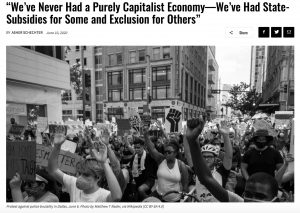Watch a discussion between UC Irvine’s Mehrsa Baradaran, Haifa University’s Eli Cook, and Chicago Booth’s Luigi Zingales on the composition, strengths, and weaknesses of different US antimonopoly pressure groups, and on what the past can teach us about the present and future of such movements.
Past workshops in our Monopolies and Politics Webinar Series, which explores the extent to which firms can leverage their market power to capture government policy, explored the role of antimonopoly pressure groups in checking the political power of monopolies.
Arguably, few countries have been more successful in building and maintaining these pressure groups than the United States. But the record of the US antimonopoly movement on issues of race is a mixed bag, where meaningful contributions to democracy and civil rights co-exist with a history of exclusion—particularly against immigrants, African Americans, and women—and alliances between New Dealers and Southern segregationists.
On June 25, the Stigler Center welcomed UC Irvine’s Mehrsa Baradaran and Haifa University’s Eli Cook for a conversation on the composition, strengths, and weaknesses of different US antimonopoly pressure groups, and on what the past can teach us about the present and future of such movements. The two discussed the complicated legacy of the Progressive Era and the New Deal and agreed that the relationship between racism and antimonopoly pressure groups is one that cannot be ignored. The conversation was moderated by Chicago Booth’s Luigi Zingales.
Watch the webinar here:
You can also read our interview with Baradaran here:
The Speakers:
Mehrsa Baradaran is a professor of law at the University of California at Irvine School of Law. Previously, she was the Robert Cotten Alston Chair in Corporate Law and Associate Dean for strategic initiatives with a focus on diversity and inclusion efforts and national and international faculty scholarship recognition at the University of Georgia School of Law. Baradaran writes about banking law, financial inclusion, inequality, and the racial wealth gap. Her scholarship includes the books How the Other Half Banks and The Color of Money: Black Banks and the Racial Wealth Gap (Harvard University Press). The latter book was awarded the Best Book of the Year by the Urban Affairs Association, the PROSE Award Honorable Mention in the Business, Finance & Management category. Baradaran was also selected as a finalist at the 2018 Georgia Author of the Year Awards for the book in the category of history/biography. @MehrsaBaradaran
Eli Cook is an Assistant Professor of American history at Haifa University in Israel. He received his PhD from Harvard University in 2013. An historian of American capitalism, his Harvard University Press book, The Pricing of Progress: Economic Indicators and the Capitalization of American Life, has been awarded two prizes for best book in intellectual history in 2017. The book roots the rise of economic indicators in the emergence of modern capitalism and the contested history of English enclosure, Caribbean slavery, American industrialization, economic thought, and corporate power. @Eli_B_Cook
Luigi Zingales (moderator) is the Robert C. McCormack Distinguished Service Professor of Entrepreneurship and Finance and the Charles M. Harper Faculty Fellow and Director of the Stigler Center at the University of Chicago Booth School of Business. His research interests span from corporate governance to financial development, from political economy to the economic effects of culture. He has published extensively in the major economics and financial journals. He also wrote two best-selling books on capitalism—Saving Capitalism from the Capitalists: Unleashing the Power of Financial Markets to Create Wealth and Spread Opportunity (with Raghuram Rajan) and A Capitalism for the People: Recapturing the Lost Genius of American Prosperity. He is the co-host of the Capitalisn’t podcast, together with Kate Waldock from Georgetown University. @zingales







